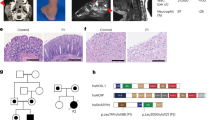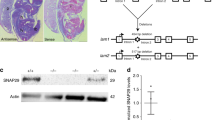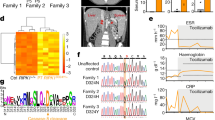Abstract
Homologues of the SHARPIN (SHANK-associated RH domain-interacting protein) gene have been identified in the human, rat and mouse genomes. SHARPIN and its homologues are expressed in many tissues. SHARPIN protein forms homodimers and associates with SHANK in the post-synaptic density of excitatory neurotransmitters in the brain. SHARPIN is hypothesized to have roles in the crosslinking of SHANK proteins and in enteric nervous system function. We demonstrate that two independently arising spontaneous mutations in the mouse Sharpin gene, cpdm and cpdmDem, cause a chronic proliferative dermatitis phenotype, which is characterized histologically by severe inflammation, eosinophilic dermatitis and defects in secondary lymphoid organ development. These are the first examples of disease-causing mutations in the Sharpin gene and demonstrate the importance of SHARPIN protein in normal immune development and control of inflammation.
This is a preview of subscription content, access via your institution
Access options
Subscribe to this journal
Receive 6 digital issues and online access to articles
$119.00 per year
only $19.83 per issue
Buy this article
- Purchase on Springer Link
- Instant access to full article PDF
Prices may be subject to local taxes which are calculated during checkout





Similar content being viewed by others
References
HogenEsch H, Gijbels M, Offerman E, Hooft Jv, Bekkum Dv, Zurcher C . A spontaneous mutation characterized by chronic proliferative dermatitis in C57BL mice. Am J Pathol 1993; 143: 972–982.
HogenEsch H, Torregrosa SE, Boggess D, Sundberg BA, Carroll J, Sundberg JP . Increased expression of type 2 cytokines in chronic proliferative dermatitis (cpdm) mutant mice and resolution of inflammation following treatment with IL-12. Eur J Immunol 2001; 31: 734–742.
HogenEsch H, Janke S, Boggess D, Sundberg JP . Absence of Peyer's patches and abnormal lymphoid architecture in chronic proliferative dermatitis (cpdm/cpdm) mice. J Immunol 1999; 162: 3890–3896.
Sundberg JP, Boggess D, Shultz LD, Fijneman R, Demant P, HogenEsch H et al. The chronic proliferative dermatitis mouse mutation (cpdm): mapping of the mutant gene locus. J Exp Anim Sci 2000; 41: 101–108.
Lim S, Sala C, Yoon J, Park S, Kuroda S, Sheng M et al. Sharpin, a novel postsynaptic density protein that directly interacts with the shank family of proteins. Mol Cell Neurosci 2001; 17: 385–397.
Daigo Y, Takayama I, Ward SM, Sanders KM, Fujino MA . Novel human and mouse genes encoding a shank-interacting protein and its upregulation in gastric fundus of W/WV mouse. J Gastroenterol Hepatol 2003; 18: 712–718.
Gijbels M, Zurcher C, Kraal G, Elliot G, HogenEsch H, Schijff G et al. Pathogenesis of skin lesions in mice with chronic proliferative dermatitis (cpdm/cpdm). Am J Pathol 1996; 148: 941–950.
Akilesh S, Shaffer DJ, Roopenian D . Customized molecular phenotyping by quantitative gene expression and pattern recognition analysis. Genome Res 2003; 13: 1719–1727.
Roopenian DC . Global pattern recognition algorithm. World Wide Web. http://www.jax.org/staff/roopenian/labsite/gene_expression.html2005.
Acknowledgements
This work was supported by grants from the National Institutes of Health (Grant no. AI060707; AR49288; CA34196). We thank Drs D Serreze and K Johnson for their critical review of this manuscript, Drs E Kim and M Lipoldova for contributing materials mentioned in the text, and D Shaffer, A Brown and J Bubier for technical assistance with real-time QPCR arrays.
Author information
Authors and Affiliations
Corresponding author
Additional information
Supplementary Information accompanies the paper on Genes and Immunity website (http://www.nature.com/gene)
Supplementary information
Rights and permissions
About this article
Cite this article
Seymour, R., Hasham, M., Cox, G. et al. Spontaneous mutations in the mouse Sharpin gene result in multiorgan inflammation, immune system dysregulation and dermatitis. Genes Immun 8, 416–421 (2007). https://doi.org/10.1038/sj.gene.6364403
Received:
Revised:
Accepted:
Published:
Issue Date:
DOI: https://doi.org/10.1038/sj.gene.6364403
Keywords
This article is cited by
-
LUBAC-mediated M1 Ub regulates necroptosis by segregating the cellular distribution of active MLKL
Cell Death & Disease (2024)
-
HOIL1 regulates group 2 innate lymphoid cell numbers and type 2 inflammation in the small intestine
Mucosal Immunology (2022)
-
SHARPIN: Role in Finding NEMO and in Amyloid-Beta Clearance and Degradation (ABCD) Pathway in Alzheimer’s Disease?
Cellular and Molecular Neurobiology (2022)
-
Dual roles for LUBAC signaling in thymic epithelial cell development and survival
Cell Death & Differentiation (2021)
-
OTULIN maintains skin homeostasis by controlling keratinocyte death and stem cell identity
Nature Communications (2021)



